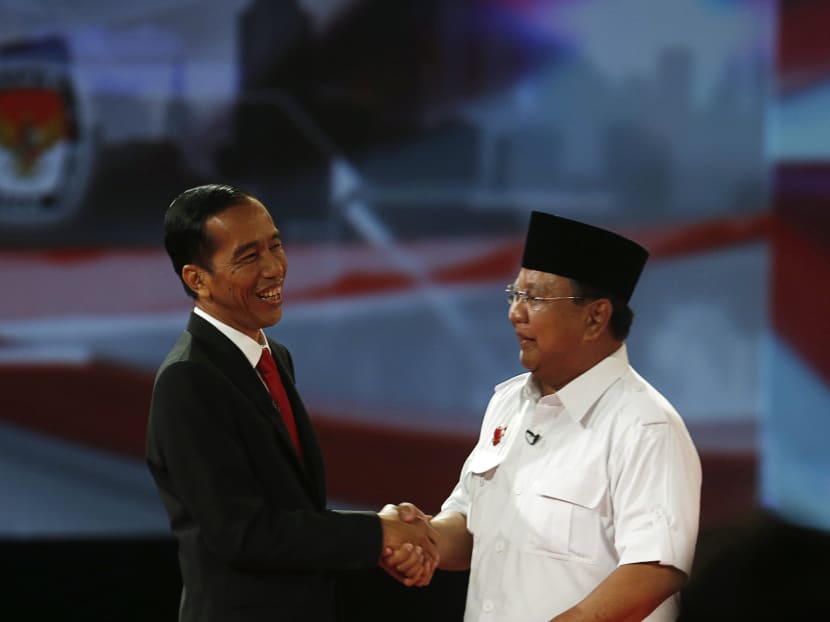Jokowi, Prabowo pledge to build citizen-centric economy
JAKARTA — The Indonesian government should play a more central role in the economy, unlike the neo-liberal model of government in Western countries, and foreign investors should not “enter Indonesia and use Indonesian money” as foreign investments should be geared towards benefiting Indonesians, said presidential candidate Prabowo Subianto yesterday.

Indonesia's presidential candidate Joko Widodo (left) shaking hands with his opponent, Mr Prabowo Subianto, after a debate in Jakarta on June 15. Photo: Reuters
JAKARTA — The Indonesian government should play a more central role in the economy, unlike the neo-liberal model of government in Western countries, and foreign investors should not “enter Indonesia and use Indonesian money” as foreign investments should be geared towards benefiting Indonesians, said presidential candidate Prabowo Subianto yesterday.
He was elaborating on his concept of a citizen-centric economy during a televised debate with his opponent, Mr Joko “Jokowi” Widodo.
Mr Prabowo also outlined a plan to allocate 1 billion rupiah (S$106,000) per year to villages in the countryside, raise the income of Indonesians by two-and-a-half times, build two million hectares of rice fields and add three thousand kilometres of roads and railroad tracks, among other things. The money, he said, would come from plugging the gap of money “leaking abroad”, which he put at 7,200 trillion rupiah a year.
The two-hour debate last night on the economy and social welfare was the second of five debates organised by the Election Commission.
Both candidates have come out in recent weeks to favour a more nationalist agenda, against the backdrop of popular perceptions that the economy has depended on selling its natural resources cheaply to foreign buyers, and that previous governments have done little to nurture and protect local businesses. Both men yesterday said they would build a more citizen-centric economy that would emphasise people rather than growth.
Mr Widodo, who spoke first, outlined his vision of improving health and education in order to enhance productivity and competitiveness. Economic progress should ultimately benefit citizens, he added.
He spoke of his “proven experience” in building traditional markets that sell the produce of fishermen and farmers, adding: “I’m here because I met so many people who want a better economy for the people, more equality, more traditional markets, cooperatives and infrastructure.”
There is a need to build systems for better management of budgets and more efficient government, he said.
Last night, Mr Prabowo appeared to speak with more conviction than he had during the first debate on Monday, when he had to address questions on his human rights record as a former general.
With only more than three weeks before the largest economy in South-east Asia heads to the polls to elect a new President, opinion polls have shown the two men in a tight race. Mr Widodo had led Mr Prabowo in opinion polls for months, but the gap between the pair has narrowed in recent weeks to about 10 per cent.
Observers said the debates could be crucial. National University of Singapore Associate Professor Bilveer Singh felt they would influence middle-class urban voters and those still undecided. He said: “Since many are predicting that the support for both the candidates is close, there is the possibility that the debates might just swing the victory in favour of one or the other.”
S Rajaratnam School of International Studies senior fellow Yang Razali Kassim noted that there was not much difference in terms of the candidates’ “ideological leanings”. “They appear to be inspired by (former President) Sukarno’s philosophy of national sovereignty, political and economic independence and ‘gotong royong’, or collective effort,” he said. “I would like to see where and how they diverge in terms of actual policies.”
Assoc Prof Singh said: “In the past 24 to 36 months, Prabowo has been projected as an ultra-nationalist, fighting for an economy that would benefit the majority of the Indonesians ... In some ways, (Mr Widodo) has also directly and indirectly signalled likewise.”
The televised debates have been a key campaign feature since Indonesians began directly electing their President in 2004.
On Sunday, the presidential candidates will meet again to debate the topic of politics and national security. Their vice-presidential candidates are scheduled to square off on the topics of human resource management and science and technology the following Saturday, before the presidential candidates and their running mates meet for the final debate on July 5, which will focus on food, energy and the environment.
Campaigning will end on July 5 and Indonesians will head to the polls on July 9 after a three-day cooling-off period.






